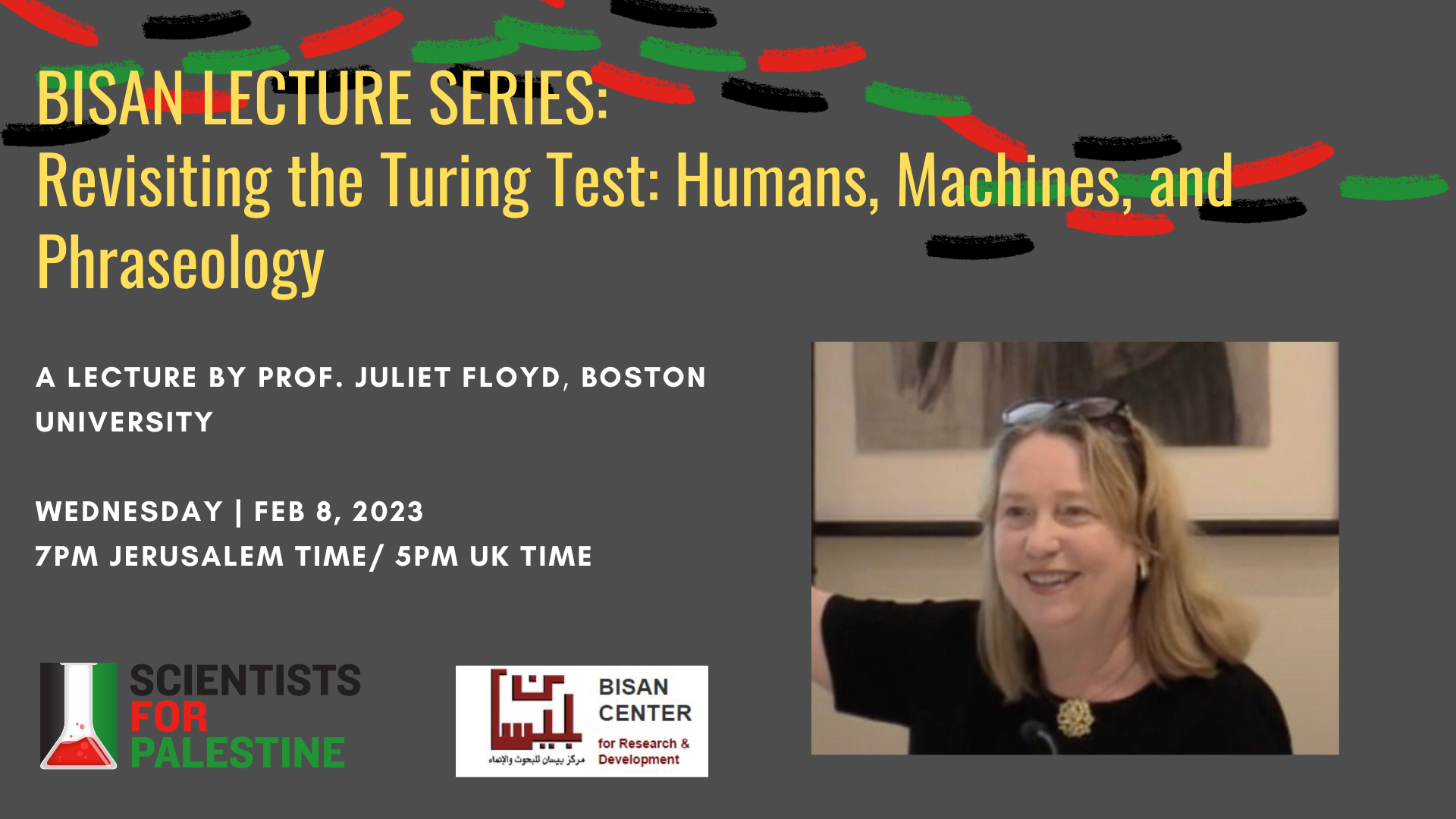The next Bisan Lecture webinar will take place on Wednesday, February 8th at 7pm Palestine time (6pm Central European Time, 12 noon US Eastern time). We will have the pleasure to welcome Prof. Juliet Floyd (Boston University) who will speak on Revisiting the Turing Test: Humans, Machines, and Phraseology. You can register for the event on Zoom here.

Dear Colleagues,
Mark Smith, professor emeritus of history at the University of Missouri, delivered the first Bisan Lecture of 2023 on January 11 (a summary with illustrations can be found here). His subject was how the Arab scholar Ibn al-Haytham, writing a millennium ago in Cairo, sought to explain the Moon Illusion, which people have witnessed with awe from antiquity to today. When the moon is viewed on the horizon at moonrise or moonset, it appears much larger to most people than when it’s higher in the sky, despite the fact that its true visual size—the angle it spans at our eyeballs—is almost exactly the same in the two cases. The Moon Illusion is discussed at the very end of Ibn al-Haytham’s monumentally influential treatise on vision, the Book of Optics. Mark used that discussion as a non-technical gateway to al-Haytham’s adaptation the work of the second century CE scholar Ptolemy, ushering in a new theory of vision that has largely survived to the present day. You can watch the video recording here. The lecture slides are available here (and here with the text).
We are pleased to announce that the next Bisan Lecture webinar will take place on Wednesday, February 8th at 7pm Palestine time (6pm Central European Time, 12 noon US Eastern time). We will have the pleasure to welcome Prof. Juliet Floyd (Boston University) who will speak on
Title: Revisiting the Turing Test: Humans, Machines, and Phraseology
You can register for the event on Zoom here.
Abstract: In this lecture I offer a re-reading of the Turing Test as a social experiment in human-to-human phraseology. Turing’s 1936 analysis of computation is reviewed in light of its resonance with Wittgenstein’s Blue and Brown Books; certain objections to the Turing Test (including Searle’s Chinese Room) are answered; and Turing’s Test for “intelligent machinery” is construed as a human challenge to articulation in the face of emerging technology. The significance of what Wolfram has called “computational irreducibility” and what Wittgenstein called the need for “surveyability” of algorithms is stressed and then placed beside contemporary concerns about nudging, algorithms and AI as these are applied with increasing precision and ubiquity in everyday life. Turing’s prescient idea, that it is human beings who bear cultural responsibility for meaningful public discussion of the sorting, typing and design of algorithms, is defended as something more fundamental than what Kahnemann, Sibony and Sunstein have recently denigrated as mere “noise”.
Biographical Sketch: Juliet Floyd
Professor Floyd is professor of philosophy at Boston University. Primarily a philosopher of logic, language, mathematics and science, her research focuses on the interplay between logic and philosophy from the 18th to the 20th centuries and extends into the philosophy of symbolic forms and their social meanings.
She is especially known for her work on Wittgenstein’s philosophy of logic and mathematics (Wittgenstein’s Philosophy of Mathematics, Cambridge Element 2021, Wittgenstein’s Remarks on Hardy’s Course of Pure Mathematics: A Non-Extensionalist Account of the Real Numbers (with Felix Mühlhölzer, Springer 2020) and the philosophy of Alan Turing (Philosophical Explorations of the Legacy of Alan Turing: Turing 100 (co-edited with A. Bokulich, Springer, 2017).
In 2016-19, professor Floyd was awarded a Mellon Sawyer Seminar Grant for faculty development (with James E. Katz and Russell Powell) to pursue research into the philosophy of emerging computational technologies and the ways they are transforming social, ethical, and philosophical aspects of everyday life. She also co-directed in 2019 The Mentoring Project For Pre-tenure Women Faculty in Philosophy.
For a more detailed bio, see here: Juliet Floyd’s bio
This lecture is sponsored by the Bisan Center for Research and Development, Scientists for Palestine and the Center for Palestinian Studies of Columbia University
Hoping to see many of you at this webinar, we send you our best regards.
The Bisan Lecture Series Steering Committee
Next BLS webinar
– Wednesday March 8, 2023, 7 pm Palestine time
Marina Warner (Mythographer, novelist and independent scholar)
– Wednesday April 12, 2023, 7 pm Palestine time
Prof. Nergis Mavalvala (MIT)
Title: The Warped Universe: the quest to discover Einstein’s elusive gravitational waves
– Wednesday May 10, 2023, 7 pm Palestine time
TBA
To receive BLS announcements, you can subscribe to the mailing list here.
BLS Statement of purpose
In concert with Scientists for Palestine and the Bisan Center for Research and Development, and in keeping with their joint commitment to full integration of Palestine in the global community of learning, the Bisan Lecture Series sponsors discourses on subjects of cultural, scientific, and societal importance by leading research experts and public intellectuals of varied heritage and viewpoint. The interactive webinars are free and open to the public, and recordings of each will be posted soon afterward.
